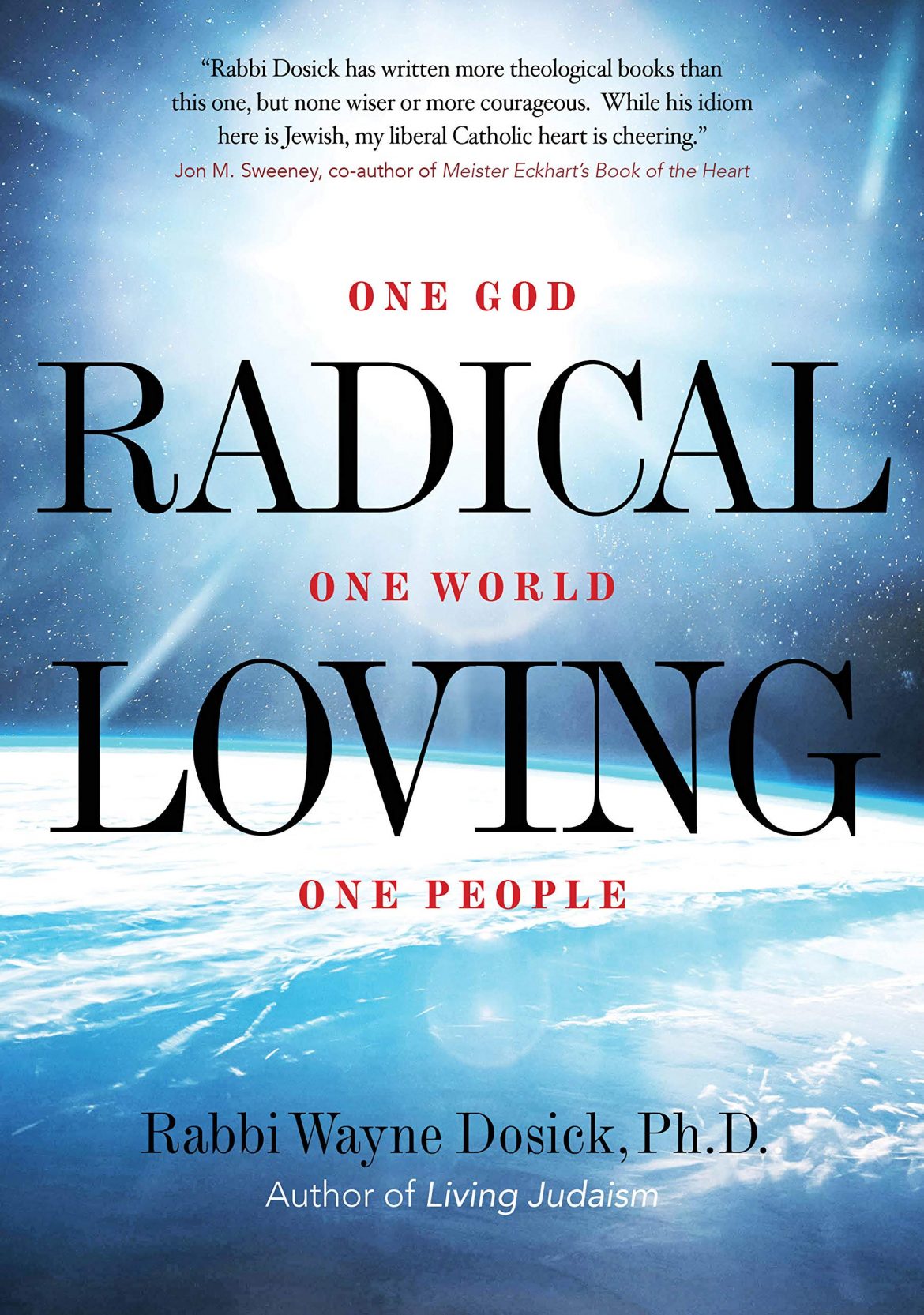My usual expectation of a “Jewish book” is to anticipate scholarship that will be flaunted and visible. How refreshing to open a new offering from a prolific rabbi and find his years of extensive study have been transubstantiated into an inspired and universal message of hope and optimism. (This offering during a time of extraordinary challenge, though the book was written before the pandemic) Rabbi Wayne Dosick’s striking new book, Radical Loving: One God, One World, One People creates a powerful path for change that requires no organized faith commitment; despite the fact that it grows directly out of the soil of religious belief and practice. The prevailing message-which is delivered in short chapters akin to homilies or brief sermons – is supreme optimism and belief in the goodness of human beings.
Each chapter or “lesson” features a unique way of teaching through anecdote or prayer, song, or story. For example, in talking about the challenge of faith, Dosick quotes from Talmud but concludes with a reminder of God’s connection with us through a quote from former UN Attorney General Dag Hammarskjold. In effect, the author makes use of the sacred and the secular to dig into everything that affirms his deeply held belief that “Radical loving” can transform the world. He translates holiness into “right action” and connects world peace to everything; including our childhood playground behavior.
The use of a Hebrew song will alternate with a story from a Native American Chief. And a quote from a Hasidic Rebbe gets as much attention as a story about Mahatma Gandhi. Dosick has a universally inspired mind, with a well of knowledge that reflects an equal opportunity intellect. While competent when quoting Torah or citing New Testament; he is telling us we are children of one Divine parent, who communicates with us In a multiplicity of languages and forms.
My favorite chapter is the one on Gratitude, where Rabbi Dosick opens where we might expect with the Hebrew morning prayer and Psalm 27. He then offers us beautiful insights from Goethe, Marcus Aurelius, and New Age teacher Gabrielle Roth. He ends with a quotation from a Beatified Irish monk, who tells us that “Joy is the echo of God’s Life Within us”. After reading through this charming pathway to a Grateful life, I feel sure that the author Is sharing what moves him in the hope that his voice will resonate with us.
In addition to the many literary and musical sources, Rabbi Wayne also provides some processes drawn from “Soul Memory Discovery” (his wife, Ellen Kaufman Dosick; is the Master Teacher of that work). Dealing with the challenge of ancestral healing, (which is a major issue for minority communities that have endured persecution) he steers us toward the use of spiritual clearing to help deal with issues that are passed down through the generations -transmitting trauma which is both inherited and experienced.
This book lays out a syllabus for the loving future; where all wisdom traditions are open and available. He is showing us that we can become one world, one people when we respect and draw on insights from all sources. Rabbi Dosick assures you that transformation is possible without jumping thru hoops. There is no demand for rigid discipline and austerity in his call for human transformation. Instead, the author offers sensible, do-able, meaningful advice on conducting a life that will help sustain the planet and benefit humans and other species living on earth. He is telling us that kindness, good deeds, decency, and caring for each other, and the planet may actually save us.
While I was reading this book I thought of it as “self-help spirituality” drawing from the “Musar” tradition of personal ethics. Because Rabbi Dosick moves comfortably from the individual to the collective (and back again) he provides a larger context for what we thought of as our private concern.
When I took more time and distance to reflect on its philosophical origins, I saw its roots in the teachings of the early Chasidic Masters. While they lived in a harsh world, their focus was on the acts of loving-kindness that humans can engage in as part of bringing all people back to the garden. Those saintly teachers from the Baal Shem Tov regarded the individual as the essential unit for creating a just world. For example, Simcha Bunem of Przysucha asks: “Who is a Good Jew” or as we might ask “who is a good human being”. Grand Rabbi Bunem answers: “goodness appears in everything s/he does”.
The Maggid of Mezerich, Dov Baer (drawing on Lurianic Kabbalah) phrases it differently. He says “the duty of each Individual is to restore the holy sparks to their source” In other words to use our lives and actions to bring the light back to its origin. so that the world can become whole again. Rabbi Wayne Dosick also teaches that each of us, in our own way, must “walk the path” improving it constantly with acts of creative generosity that expand our spirits, even as we help pave the way.
Click Here to make a tax-deductible contribution.
